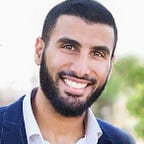The Uncertainty of COVID-19 Testing — Amizur Nachshoni
In early June my husband Kevin and I flew to Los Angeles from our home in Austin, Texas. That wasn’t for a holiday. We were going to see a specialist about a rare medical condition I have, who has been treating me for the past two years. I got tested for COVID-19 a week before we left. The results were negative but after test results, I was about to go through days of anxiety chasing.
When we arrived at Austin airport on June 3rd for our departure, nobody asked if we had COVID-19 or were exposed to anybody with the virus. None took our temperature and many people didn’t wear masks. This, after all, is Texas.
We had read our airline didn’t sell middle seats. Incorrect. About half of the flight’s middle seats were seized. A young man appeared in the aisle and told us that my husband and I had an assigned seat. Kevin asked him if he would mind finding a different seat and he graciously moved a few rows behind us to an empty one.
Upon arriving at Los Angeles International Airport we were picked up by an old college friend. Kevin and I were sitting in the backseat. We were all wearing N-95 masks. It was a comical situation. Back in 1969, my friend and I had protested the Vietnam War together in Washington, D.C. — it seems like a picnic compared to what the world is now facing.
These days, patients are required to test COVID-19 negative within 48 hours of any surgical procedure. The three of us drove straight to a test site located in a garage parking lot. The place appeared chaotic and we felt rushed because a mandatory city curfew caused the site to close early. I have seen my specimen tube handled by no less than three people, but I was confident the test would be negative since the Austin test had been negative.
On the downtown drive, witnessing buildings that had been looted or burned down during protests was terrifying. We stayed in a beautiful Airbnb near the hospital that night but blared sirens in the distance and a helicopter whirled nearby. Then, the house started shaking. My friend called in to report there was an earthquake in Los Angeles that recorded 5.1 that night on the Richter scale.
Having lived in New York, New Mexico, and Texas, during an earthquake, I had no idea where one is going. Hide beneath the bed? Step into a doorway? Go outside? I asked my friend, a longtime resident of Los Angeles if that was normal for L.A. She answered nothing was normal for L.A.
When I arrived at the hospital admissions department at 6:30 a.m. the next morning, the desk clerk informed me that my procedure had been canceled and refused to explain why. Moments later my doctor called me and told me that the results of my COVID-19 tests were positive. I was quite distracted and in shock. I didn’t show any symptoms. What is it that I should do?
We couldn’t get on a plane to fly home in good conscience so we rented a car and drove back to Austin from Los Angeles. Most public restrooms on the route were closed to the public to add insult to injury. We were forced to exploit the great outdoors. We chose not to stay in a motel because I didn’t want to spread it if I was truly positive for coronavirus, and if I was negative I was spoken enough that I didn’t want to risk exposure in a motel on the roadside.
We ended up sleeping in the rental car parked in the upscale neighborhood of Tucson, Arizona, for a few hours. The drive to Austin took us 24 hours. We lived on muffins and fruit that we brought with us and thanked the powers-that-be for tape books. We reached home at about 6 p.m. Friday 5 June. My neck, my back, and my shoulders were sore.
Kevin and I had been tested for coronavirus the following Monday yet again. Neither of us had any symptoms. We learned Tuesday morning both of our tests were negative.
It turns out that there is a small chance of diagnostic testing in the Centers for Disease Control and Prevention status resulting in a false positive or even a false negative. A number of factors may make a test less reliable — for example, the instruments and chemicals used in the test, or the way the sample is collected. Contamination may result in false positives, as I suspect was the case with the rushed job done before my surgery.
After everything that happened, where nothing seemed normal, I could not stand the idea of going back to Los Angeles. Happily, after collaborating with the California specialist, I was able to have my local doctor perform the procedure.
Hoping this is the end of my nightmare testing. The consequences of delaying my medical treatment due to the result of a false-positive test may have been serious. Do your due care, folks.
Amizur Nachshoni is an Israeli native, who has been living in Israel and the US for many years. He is the author of many novels, “The Yemen Journey,” “Adapting to New Surroundings,” and more.
#COVID19 #AmizurNachshoni #Amizur #Nachshoni #safe #US #Israel #story #interview #testing
